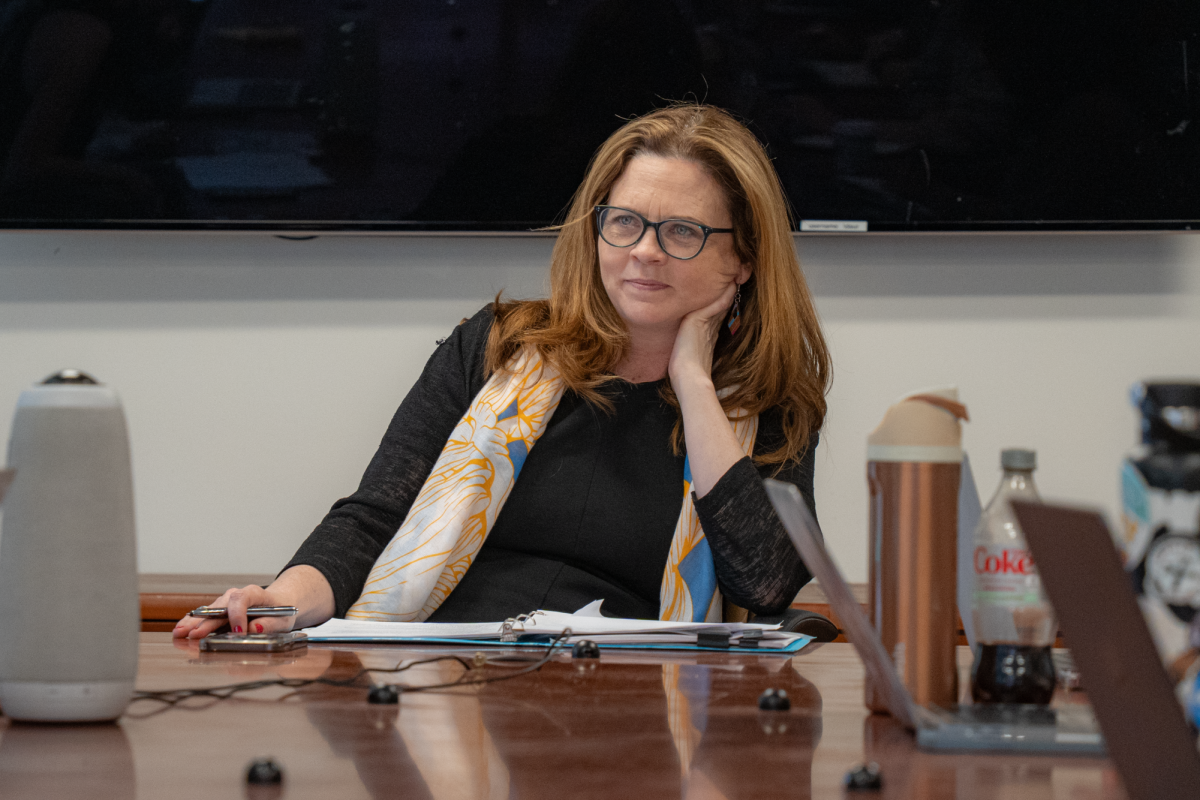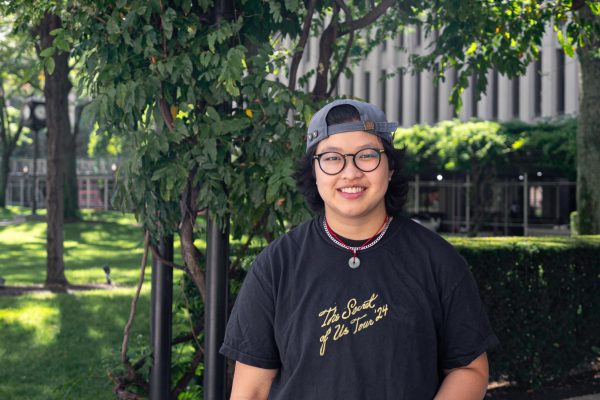University President Tania Tetlow addressed serious issues plaguing Fordham University and higher education in America at a meeting with the student press on April 8.
Tetlow fielded questions on the student visa revocation of two Fordham students, the 4.65% tuition increase, and why Fordham students should practice civic engagement.
On Friday, April 4, Tetlow sent a university-wide email that announced an international undergraduate Fordham student’s visa was revoked by the Department of Homeland Security. During the press conference Tetlow revealed that a second student’s visa was revoked.
This interview has been lightly edited and condensed for clarity.
I think everything within our control at Fordham is going stunningly well and I’m excited about that. Tania Tetlow, University President
The Observer: You said in your email that you wish that it was in your power to offer more reassurance. Is it painful to be in a position where you understand that something is frightening, but you don’t know what you can do about it?
Tetlow: Yes. My job is to provide hope and that is getting harder and I am, frankly, pretty angry about what’s going on right now.
The Ram: We heard that the DHS did not contact the University, and I know that the Columbia Spectator just published an article about how Columbia University does routine daily checks on this service SEVIS (Student Exchange and Visa Program) to check to see if students’ visas are going well. Does Fordham do the same thing? Is that how they figured it out?
Tetlow: Yes, and you didn’t used to have to do that because there was no need to psychically intuit the government had changed its mind about a visa. So yes, we have been checking every morning, and that’s how we found out.
Ram: And then did the university alert the student?
Tetlow: Yes.
Ram: So, the student wasn’t contacted by DHS either?
Tetlow: No.
Ram: Since, has the DHS been in contact or provided a reason for the revocation?
Tetlow: Not that we know of, no. Not to us and I don’t believe to the student, although I don’t know the last one we talked to him.
Ram: And are you guys in contact with this current student at all?
Tetlow: Yes. We’re trying to provide as much support as we can because it is an unimaginable situation, and we are so upset on his behalf.
Observer: As of now, is there only one student who has had their visa revoked?
Tetlow: No, this morning we found another. But I don’t know that we’ve reached that student yet, so I can’t talk about it with specificity because, as you can imagine, international students have privacy rights that we leave up to them. So, we’re not trying to share too specific details about them, that would be their choice.
Observer: Looking forward to next year, are you afraid that this uncertainty about the status of international students will decrease the amount of students who choose to enroll in Fordham from outside the United States?
Tetlow: I can imagine it will decrease the number of international students who enroll in institutions across the country. So, it won’t be specific to Fordham, but I do worry about that.
Observer: What do you feel Fordham will lose in that eventuality?
Tetlow: American higher education has been one of the great exports of this country. The quality and prestige of our institutions has been something that has brought so many, I won’t say best and brightest minds because they are everywhere around the world, but the quality of our institutions has brought so many brilliant students and scholars to this country, some of whom stay. It has been a source of American influence around the world that so many people who become leaders of their countries were educated at universities here. I cannot fathom why anyone would damage that work.
Ram: I’m curious to know the reasoning behind sending out the email about the student. Why did you think that the Fordham community needed to know?
Tetlow: I want as many people as possible to know that this is happening and to spread the word through our community, through our board. All the stories that you are seeing about this happening nationally, it matters to know it is hitting home.
Observer: What would you say you want the Fordham community to do with that information?
Tetlow: We always walk a line of not wanting to create anxiety for students when they will feel powerless to do anything about the situation, which is a very real issue here, but also needing you to know what’s going on in the world that is affecting your classmates. I think for students to understand that their colleagues and friends who are here on student visas may well be feeling anxious and deserve support and empathy at this moment would be a good start. That is within our control to do. I don’t want to talk politics in a divisive way, but that which affects Fordham directly I need to tell you about and then you tell the world what you think of it.
Ram: I’m curious if you know what Fordham stands to lose if there’s some kind of federal challenge like we’ve seen at Columbia and Harvard? If you know how much money we receive from the federal government and if that’s something you’re concerned about?
Tetlow: We receive more than 30 million a year in federal research grants. Beyond that, though, like every university, we receive the financial aid that students are awarded from the government and bring to each institution. So that would include Pell Grants, work study and federally guaranteed student loans, along with a few other programs as well. So what Title VI and other laws say is that if we do not comply with the statutes on the books, that you can lose all federal funding.
Ram: And sort of a follow up, the EPA grant. Are there concerns about that at all?
Tetlow: As of yet, it is still in place. But I think all of higher ed is concerned with all of the grants.
Observer: About the tuition increase for the next academic year, where is the tuition increase going?
Tetlow: The cost of educating students has gone up for all the reasons you might imagine. We are very aware that costs have also gone up for your families, that inflation hits your families as well. So our first priority is to contain those costs as much as we can. In general, bridging the gap between the excellence that students deserve and the price they can afford to pay is brutally hard. Our highest priority in the budget is financial aid, it’s hundreds of millions a year. We continue to raise money from alumni for financial aid and so about half of our endowment is dedicated to scholarship funds, and that was a big part of the last fundraising campaign, and we will continue to make that the highest priority. For students who absolutely can’t afford the higher cost of their education, by cost I mean cost to provide it, not just cost and tuition, they should let financial aid know and file an appeal.
Observer: Is there anything that you’re looking forward to in the next academic year and possibly beyond for Fordham?
Tetlow: I think everything within our control at Fordham is going stunningly well and I’m excited about that. And the challenge at this moment for everyone, given the level of uncertainty, is to keep doing the work that matters, to not get too distracted by that level of uncertainty from the fundamentals. What I remind the faculty and staff and administrators is that our job is to teach and serve and support the students at Fordham, and that’s what keeps me going and keeps them going and makes us love our work, even when it’s challenging.
Sam Bracy and Michelle Wilson contributed additional reporting to this story



